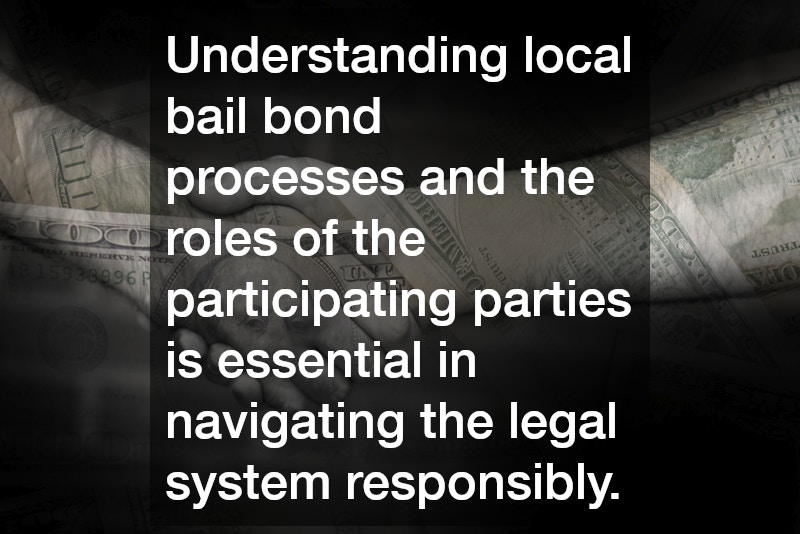Bail bonds play a crucial role in the judicial system by allowing defendants a degree of freedom while awaiting trial. These local bail bonds are a financial guarantee that the defendant will appear in court on the assigned dates. By understanding bail bonds, defendants and their families can better navigate the complexities of the legal system.
The purpose of bail bonds is twofold: ensuring that defendants show up for court and protecting public safety. When a defendant is unable to afford the full cash bail, a bail bond provides an alternative by covering the cost. Bail bondsmen, as intermediaries, facilitate this transaction by posting bail on behalf of the defendant in exchange for a fee.
What is the Process of Obtaining a Bail Bond?
Understanding the Bail Bond System
The bail bond system operates on fundamental legal principles, which ensure that defendants are incentivized to attend court dates. This system is deeply rooted in the presumption of innocence, allowing individuals to maintain employment and family ties while awaiting trial. Without this mechanism, many individuals might find themselves unnecessarily detained pre-trial.
Bail bonds work through a surety agreement, in which the bail bondsman acts as a guarantee for the defendant’s appearance. The legal framework mandates that such bonds are conditional upon the defendant appearing in court as directed. By offering bail bonds, these agencies effectively bridge the financial gap for defendants who cannot afford court-ordered bail amounts.
Steps to Secure a Bail Bond
To secure a bail bond, the first step is to reach out to a reputable bail bondsman. This contact usually happens soon after a judge sets bail, and the bondsman explains the terms, fees, and responsibilities. The agent will require the defendant’s full details and the amount of bail set by the court.
Once initial contact is made, the prospective indemnitor must fill out a series of forms, providing personal and financial information. This documentation is necessary for both the bail bondsman’s legal requirements and the establishment of trust between the parties. After signing these agreements, the bail bondsman will post the bail, securing the defendant’s release.
Requirements for the Indemnitor
An indemnitor, also known as a co-signer, has significant financial and legal obligations when signing for a bail bond. They must possess sufficient assets to guarantee the defendant’s bail amount and be willing to cover the full cost if the defendant defaults. The Indemnitor essentially assures the court that the defendant will appear for all scheduled hearings.
Financial commitments can include providing collateral such as property, vehicles, or other assets. The Indemnitor needs to understand the risks involved, including the potential loss of this collateral should the defendant fail to appear. Their legal responsibilities extend to ensuring the defendant adheres to all judicial conditions imposed with the bail.
What Happens If a Defendant Fails to Appear in Court?
Consequences for the Defendant
If a defendant fails to appear in court, they face serious legal consequences beyond the original charges. The most immediate repercussion is the issuance of a bench warrant for their arrest, which leads to additional criminal charges like failure to appear. Such actions significantly undermine the court’s trust, complicating any plea bargains or sentencing.
These legal ramifications often include fines and the forfeiture of bail, meaning the defendant loses the right to reclaim any posted bail money. The non-appearance may also impair their credibility, leading to harsher penalties in future interactions with the judicial system. It’s important to communicate with legal counsel promptly if unforeseen circumstances prevent attending a court date.
Failing to appear compromises the defendant’s legal standing and may lead to pretrial detention without bail, seen as a flight risk. This outcome reinforces the importance of understanding the conditions attached to bail and making every effort to meet legal obligations diligently. Awareness of these consequences underscores the criticality of responsible court appearance behavior.
Role of the Bail Bondsman
When a defendant fails to appear, the bail bondsman plays a pivotal role in resolving the situation. Their primary objective is to recover the defendant and mitigate financial losses stemming from the forfeited bail. Bondsmen often hire bounty hunters or skip tracers to locate and return the defendant to custody.
In conclusion, understanding local bail bond processes and the roles of the participating parties is essential in navigating the legal system responsibly. Bail bonds offer a way for defendants to maintain personal and professional lives while awaiting court appearances. However, the responsibilities attached to them underscore the importance of careful consideration before proceeding.
.

